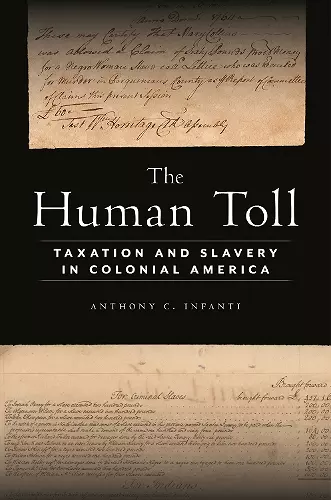The Human Toll
Taxation and Slavery in Colonial America
Format:Hardback
Publisher:New York University Press
Published:13th May '25
Currently unavailable, and unfortunately no date known when it will be back

How the thirteen colonies deployed the power of taxation to support, promote, and perpetuate the institution of slavery
The Human Toll documents how the American colonies used tax law to dehumanize enslaved persons, taxing them alongside valuable commodities upon their forced arrival and then as wealth-generating assets in the hands of slaveholders. Anthony C. Infanti examines how taxation also proved to be an important component for subjugating and controlling enslaved persons, both through its shaping of the composition of new arrivals to the colonies and through its funding of financial compensation to slaveholders for the destruction of their "property" to ensure their cooperation in the administration of capital punishment. The variety of tax mechanisms chosen to fund slaveholder compensation payments conveyed messages about who was thought to benefit from—and, therefore, who should shoulder the burden of—slaveholder compensation while opening a revealing window into these colonial societies.
While the story of colonial tax law is intrinsically linked to advancing slavery and racism, Infanti reveals how several colonies used the power of taxation as a means of curtailing the slave trade. Though often self-interested, these efforts show how taxation can be used not only in the service of evil but also to correct societal injustices. Providing a fascinating account of slavery's economic entrenchment through the history of American tax law, The Human Toll urges us to consider the lessons that fiscal history holds for those working in the reparations movement today.
"Shows that taxes were not merely part of early American society, but rather embedded deeply in its social fabric and central to normalizing slavery as everyday practice. If the only guarantees in life are death and taxes, The Human Toll enriches our understanding of colonial American social, legal, and labor history." - Jared Ross Hardesty, author of Mutiny on the Rising Sun: A Tragic Tale of Slavery, Smuggling, and Chocolate "Taxation has always been central to nearly all aspects of U.S. law and society, including the horrors of American slavery. With his brilliant new book, Anthony Infanti turns his critical gaze to the past to show how colonial tax laws, fiscal policies, and public administration protected and promoted the evils of America's "peculiar institution." This book highlights the inextricable historical link between taxation and slavery. With prodigious research in primary historical sources and his deep knowledge of tax law, Infanti not only demonstrates how colonial officials nefariously used taxation to advance white supremacy; he also provides a "usable past" to help us navigate contemporary concerns about reparations and modern American race relations." - Ajay K. Mehrotra, author of Making the Modern American Fiscal State: Law, Politics, and the Rise of Progressive Taxation, 1877 – 1929 "A path-breaking investigation of the use of taxation to regulate slavery in the American colonial era…Infanti is able to provIde glimpses of individuals affected by these tax regimes - both enslaved people and their slaveholders. This book provides an excellent look at the centrality of race and slavery as our nation was developing through its colonial period and beyond." - Carolyn Jones, Dean Emerita, University of Iowa College of Law "By examining in engrossing details, the ways in which taxation supported slavery in colonial America—especially in South Carolina, but in all the other colonies as well—Anthony Infanti exposes the hollowness of modern anti-tax rhetoric equating taxation in the twenty-first century with slavery." - Lawrence A. Zelenak, author of Figuring Out the Tax: Congress, Treasury, and the Design of the Early Modern Income Tax
ISBN: 9781479829866
Dimensions: unknown
Weight: 658g
328 pages